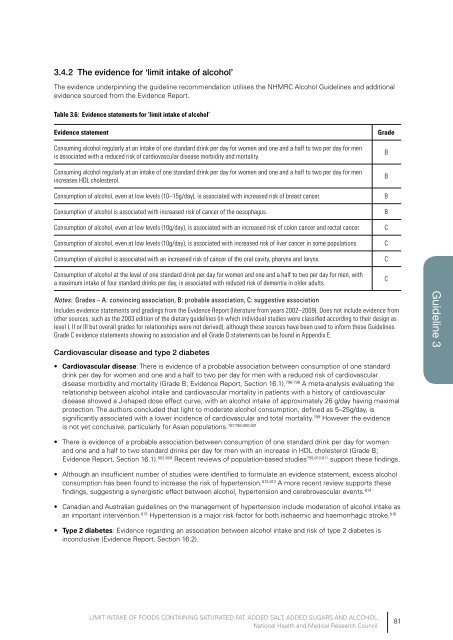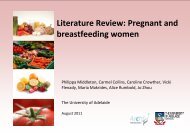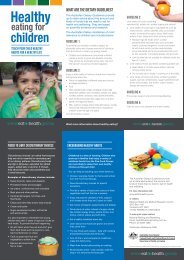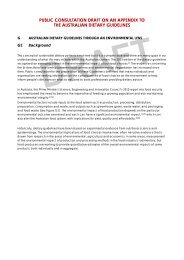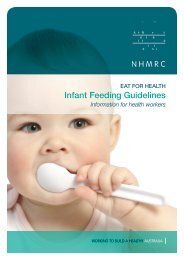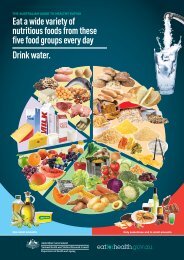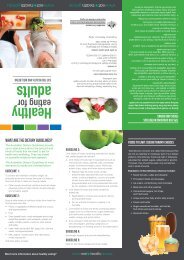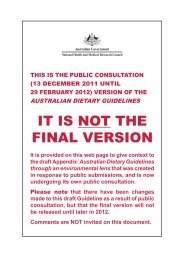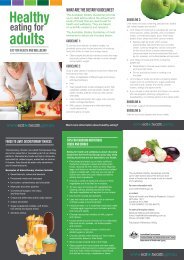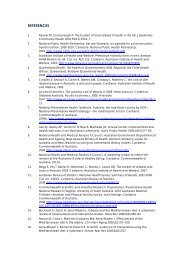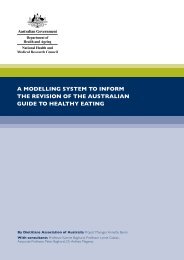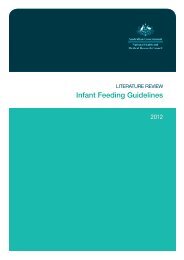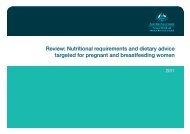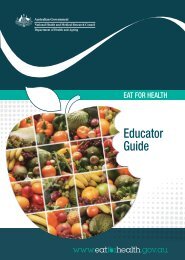Guidelines Dietary - Eat For Health
Guidelines Dietary - Eat For Health
Guidelines Dietary - Eat For Health
- No tags were found...
You also want an ePaper? Increase the reach of your titles
YUMPU automatically turns print PDFs into web optimized ePapers that Google loves.
3.4.2 The evidence for ‘limit intake of alcohol’The evidence underpinning the guideline recommendation utilises the NHMRC Alcohol <strong>Guidelines</strong> and additionalevidence sourced from the Evidence Report.Table 3.6: Evidence statements for ‘limit intake of alcohol’Evidence statementConsuming alcohol regularly at an intake of one standard drink per day for women and one and a half to two per day for menis associated with a reduced risk of cardiovascular disease morbidity and mortality.Consuming alcohol regularly at an intake of one standard drink per day for women and one and a half to two per day for menincreases HDL cholesterol.Consumption of alcohol, even at low levels (10–15g/day), is associated with increased risk of breast cancer.Consumption of alcohol is associated with increased risk of cancer of the oesophagus.Consumption of alcohol, even at low levels (10g/day), is associated with an increased risk of colon cancer and rectal cancer.Consumption of alcohol, even at low levels (10g/day), is associated with increased risk of liver cancer in some populations.Consumption of alcohol is associated with an increased risk of cancer of the oral cavity, pharynx and larynx.Consumption of alcohol at the level of one standard drink per day for women and one and a half to two per day for men, witha maximum intake of four standard drinks per day, is associated with reduced risk of dementia in older adults.GradeBBBBCCCCNotes: Grades – A: convincing association, B: probable association, C: suggestive associationIncludes evidence statements and gradings from the Evidence Report (literature from years 2002–2009). Does not include evidence fromother sources, such as the 2003 edition of the dietary guidelines (in which individual studies were classified according to their design aslevel I, II or III but overall grades for relationships were not derived), although these sources have been used to inform these <strong>Guidelines</strong>.Grade C evidence statements showing no association and all Grade D statements can be found in Appendix E.Cardiovascular disease and type 2 diabetesGuideline 3• Cardiovascular disease: There is evidence of a probable association between consumption of one standarddrink per day for women and one and a half to two per day for men with a reduced risk of cardiovasculardisease morbidity and mortality (Grade B; Evidence Report, Section 16.1). 796-798 A meta-analysis evaluating therelationship between alcohol intake and cardiovascular mortality in patients with a history of cardiovasculardisease showed a J-shaped dose effect curve, with an alcohol intake of approximately 26 g/day having maximalprotection. The authors concluded that light to moderate alcohol consumption, defined as 5–25g/day, issignificantly associated with a lower incidence of cardiovascular and total mortality. 799 However the evidenceis not yet conclusive, particularly for Asian populations. 787,788,800,801• There is evidence of a probable association between consumption of one standard drink per day for womenand one and a half to two standard drinks per day for men with an increase in HDL cholesterol (Grade B;Evidence Report, Section 16.1). 802-809 Recent reviews of population-based studies 799,810,811 support these findings.• Although an insufficient number of studies were identified to formulate an evidence statement, excess alcoholconsumption has been found to increase the risk of hypertension. 812,813 A more recent review supports thesefindings, suggesting a synergistic effect between alcohol, hypertension and cerebrovascular events. 814• Canadian and Australian guidelines on the management of hypertension include moderation of alcohol intake asan important intervention. 815 Hypertension is a major risk factor for both ischaemic and haemorrhagic stroke. 816• Type 2 diabetes: Evidence regarding an association between alcohol intake and risk of type 2 diabetes isinconclusive (Evidence Report, Section 16.2).Limit intake of foods containing saturated fat, added salt, added sugars and alcoholNational <strong>Health</strong> and Medical Research Council81


